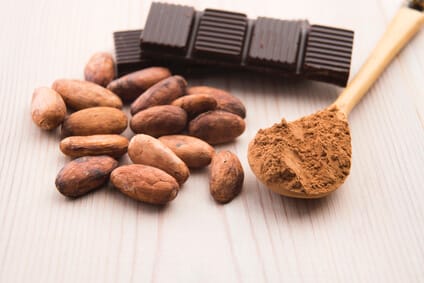Ahhhh! Better Than Red Wine Or Green Tea, Cocoa Froths With Strong
Anti-Oxidants/Cancer-Preventing Compounds, Cornell Food Scientists Say
Ithaca, N.Y.: There is a new reason to enjoy hot cocoa (Cacao theobromo or Real Chocolate) on a cold winter’s night in front of a cozy fire or anytime and all the time! Consider it a health drink and health food as health promoting as it is delicious.
Beyond the froth, cocoa (Cacao theobromo or Real Chocolate) teems with antioxidants that prevent cancer, cardiovascular disease, and a wide range of other disorders. Cornell University food scientists and other researchers compared the anti-cancer activity in beverages known to contain antioxidants.They have found that cocoa has more than twice the antioxidants of red wine and more than five times those found in green tea.
The strong anti-oxidants in cocoa (Cacao theobromo or Real Chocolate) have significant benefits for both prevention and treatment of a wide range of disorders plus such notable areas as sports and activity. Learn more about the benefits of cocoa in our “Sports & Activity Herbs” series of two classes the next two Wednesday nights. Also, learn much more in both our NHI Certified Clinical Master Herbalist (CCMH) Program which is on Wednesday nights and equally important in our Certified Nutritionist Consultant (CNC) Program which is on Tuesday nights. You can join either or both programs at anytime. and/or take individual modules or nights. See our NHI Schedule for more information.
The research finding was published Dec 3, 2003 in the American Chemical Society’s Journal of Agriculture and Food Chemistry, a peer-reviewed publication.
The Cornell researchers, led by Chang Y. (Cy) Lee, chairman of the Department of Food Science and Technology at the university’s New York State Agricultural Experiment Station in Geneva, N.Y., say the reason that cacao leads the other drinks in protecting against cancer, heart disease and other ailments is its high content of compounds called phenols, or flavonoids, indicating the presence of strong antioxidants. They discovered 611 milligrams of the phenolic compound gallic acid equivalents (GAE) and 564 milligrams of the flavonoid epicatechin equivalents (ECE) in a single serving of cocoa. Examining a glass of red wine, the researchers found 340 milligrams of GAE and 163 milligrams of ECE. In a cup of green tea, they found 165 milligrams of GAE and 47 milligrams of ECE.
“If I had made a prediction before conducting the tests, I would have picked green tea as having the most antioxidant activity,” sad Lee. “When we compared one serving of each beverage, the cocoa turned out to be the highest in antioxidant activity, and that was surprising to me.” Phenolic compounds protect plants against insects and pathogens, and they remain active even after food processing. A decade ago “food scientists did not know that phenolics had an important role in human health,” says Lee.
Lee and his colleagues used two chemical tests that measured how well the cocoa compounds scavenge for free radicals agents that cause cancer, heart disease and other diseases.
In the paper, the researchers discuss eating chocolate bars instead of drinking cocoa. “Although a bar of chocolate exhibits strong antioxidant activity, the health benefits are still controversial because of the saturated fats present,” the researchers write. They explain that cocoa has about one-third of a gram of fat per one-cup serving, compared with eight grams of fat in a standard-size 40-gram chocolate bar. (24 times more fat).
The research paper is titled “Cocoa has More Phenolic Phytochemicals and a Higher Antioxidant Capacity than Teas and Red Wine”
This information has been adapted from a news release issued by Cornell University. 12/19/2003
Cocoa (Cacao theobromo or Real Chocolate) has many other beneficial constituents and generates many, many other significant benefits for both prevention and treatment of a wide range of disorders plus such notable areas as sports and activity. Learn more about the benefits of cocoa in our “Sports & Activity Herbs” series of two classes the next two Wednesday nights. Also, learn much more in both our NHI Certified Clinical Master Herbalist (CCMH) Program which is on Wednesday nights and equally important in our Certified Nutritionist Consultant (CNC) Program which is on Tuesday nights. You can join either or both programs at anytime. and/or take individual modules or nights. See our NHI Schedule for more information.

